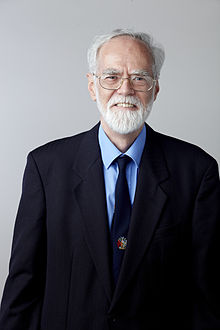Gareth A. Morris
Gareth Morris | |
|---|---|
 Morris in 2014, portrait via the Royal Society | |
| Born | Gareth Alun Morris July 6, 1954[2] |
| Alma mater | University of Oxford |
| Known for | |
| Awards |
|
| Scientific career | |
| Fields | NMR spectroscopy |
| Institutions | University of Manchester |
| Thesis | New techniques in fourier transform nuclear magnetic resonance (1978) |
| Doctoral advisor | Ray Freeman[1] |
| Website | www |
Gareth Alun Morris FRS[5] is a Professor of Physical Chemistry, in the School of Chemistry at the University of Manchester.[6][7][8][9][10][11][12]
Education
Morris was educated at the Royal Grammar School, Newcastle and Magdalen College, Oxford[2] where he was awarded a DPhil in 1978.[1]
Research
Research in the Morris lab involves the development of novel nuclear magnetic resonance spectroscopy techniques, and their application to problems in chemistry, biochemistry, and medicine.
Awards and honours
Morris was elected a Fellow of the Royal Society in 2014. His nomination reads:
Gareth Morris is one of the world's foremost innovators in high resolution nuclear magnetic resonance spectroscopy, and has had a major influence on the determination of chemical structure by NMR. Almost all commercial NMR spectrometers contain hardware and software that he originated, including deuterium gradient shimming (now standard on commercial spectrometers) and ingenious pulse sequences such as DANTE (the prototypical selective excitation sequence) and INEPT (now a key component of multidimensional NMR techniques, including many of those used for protein 3D structure determination). The impact and wide applicability of Morris’s contributions have made them indispensable components of the state-of-the-art NMR toolkit.[5]
Morris received the James Shoolery Award 2015 awarded by SMASH (Small molecule NMR conference):
It is hard to imagine an NMR laboratory in the world which is not influenced daily by his developments from the foundations of INEPT and DANTE, through to modern gradient shimming, DOSY and pure shift methods.[13]
References
- ^ a b Morris, Gareth Alun (1978). New techniques in fourier transform nuclear magnetic resonance (DPhil thesis). University of Oxford.
- ^ a b MORRIS. "MORRIS, Prof. Gareth Alun". Who's Who. Vol. 2015 (online Oxford University Press ed.). A & C Black.
{{cite encyclopedia}}: Unknown parameter|othernames=ignored (help) (Subscription or UK public library membership required.) (subscription required) - ^ Brown, J. M.; Chaloner, P. A.; Morris, G. A. (1987). "The catalytic resting state of asymmetric homogeneous hydrogenation. Exchange processes delineated by nuclear magnetic resonance saturation-transfer (DANTE) techniques". Journal of the Chemical Society, Perkin Transactions 2 (11): 1583. doi:10.1039/P29870001583.
- ^ Morris, G. A. (1980). "Sensitivity enhancement in nitrogen-15 NMR: Polarization transfer using the INEPT pulse sequence". Journal of the American Chemical Society. 102: 428–429. doi:10.1021/ja00521a097.
- ^ a b "Professor Gareth Morris FRS". London: The Royal Society. Archived from the original on 2014-06-07.
- ^ Morris, G. A.; Freeman, R (2011). "Selective excitation in Fourier transform nuclear magnetic resonance. 1978". Journal of Magnetic Resonance. 213 (2): 214–43. doi:10.1016/j.jmr.2011.08.031. PMID 22152346.
- ^ Gareth A. Morris's publications indexed by the Scopus bibliographic database. (subscription required)
- ^ Morris, G. A.; Freeman, R. (1979). "Enhancement of nuclear magnetic resonance signals by polarization transfer". Journal of the American Chemical Society. 101 (3): 760–762. doi:10.1021/ja00497a058.
- ^ Bodenhausen, G.; Freeman, R.; Morris, G. A. (1976). "A simple pulse sequence for selective excitation in Fourier transform NMR". Journal of Magnetic Resonance (1969). 23: 171–175. doi:10.1016/0022-2364(76)90150-5.
- ^ Bax, A.; Morris, G. A. (1981). "An improved method for heteronuclear chemical shift correlation by two-dimensional NMR". Journal of Magnetic Resonance (1969). 42 (3): 501–505. doi:10.1016/0022-2364(81)90272-9.
- ^ Gareth A. Morris publications indexed by Microsoft Academic
- ^ Pelta, M. D.; Barjat, H.; Morris, G. A.; Davis, A. L.; Hammond, S. J. (1998). "Pulse sequences for high-resolution diffusion-ordered spectroscopy (HR-DOSY)". Magnetic Resonance in Chemistry. 36 (10): 706–714. doi:10.1002/(SICI)1097-458X(199810)36:10<706::AID-OMR363>3.0.CO;2-W.
- ^ http://smashnmr.org/awards/shoolery-award-recipient
